Health Ethics: End-of-Life Care, Ethical Considerations and Treatments
VerifiedAdded on 2022/08/12
|9
|1372
|36
Report
AI Summary
This report provides a comprehensive overview of the ethical considerations in end-of-life care. It begins by defining the grey areas between treatment choices and withdrawal, particularly in terminal conditions like cancer and coma. The report explores the emotional complexities faced by patients, families, and healthcare providers, highlighting the ethical dilemmas surrounding end-of-life care decisions. It addresses key ethical issues, including lack of informed consent, conflict of interest, and the transition from life-prolonging treatments to palliative care. The report further discusses ethical considerations in decision-making, such as breaching autonomy and non-maleficence, and examines the role of pain management and resource allocation. The importance of ethical compliance by healthcare staff and legal workers is emphasized, along with recommendations for balanced decision-making. References to relevant sources are provided.
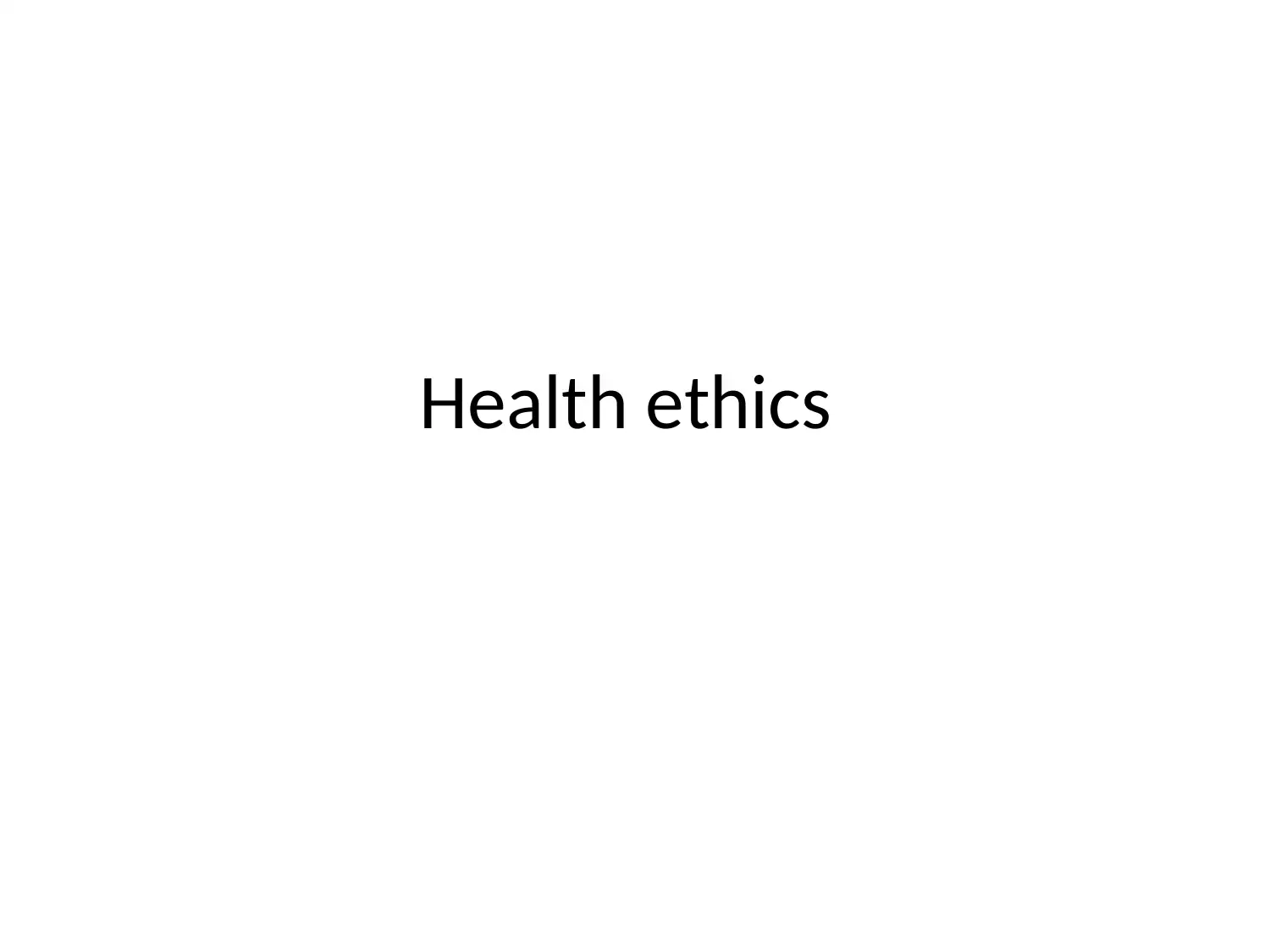
Health ethics
Paraphrase This Document
Need a fresh take? Get an instant paraphrase of this document with our AI Paraphraser
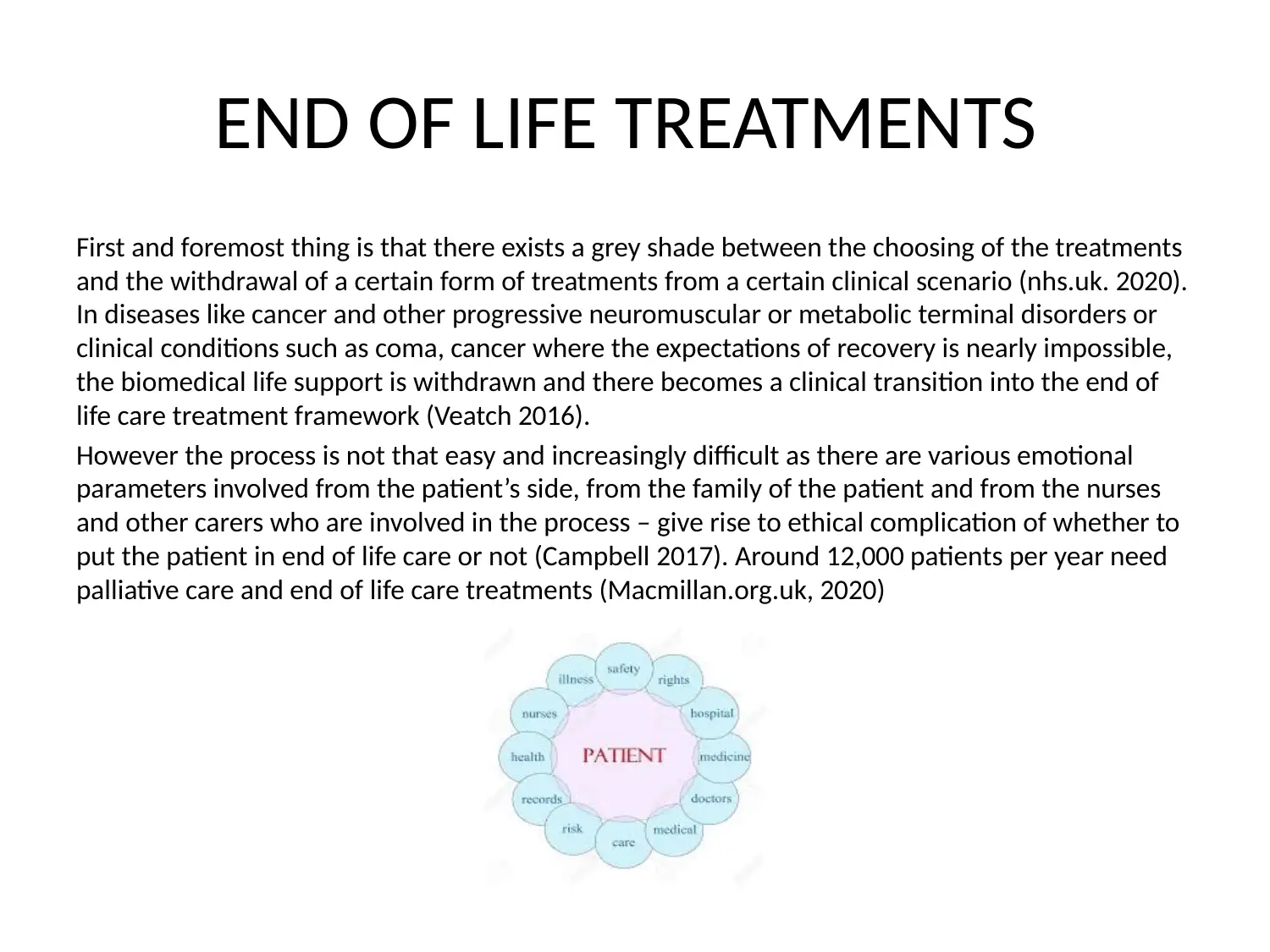
END OF LIFE TREATMENTS
First and foremost thing is that there exists a grey shade between the choosing of the treatments
and the withdrawal of a certain form of treatments from a certain clinical scenario (nhs.uk. 2020).
In diseases like cancer and other progressive neuromuscular or metabolic terminal disorders or
clinical conditions such as coma, cancer where the expectations of recovery is nearly impossible,
the biomedical life support is withdrawn and there becomes a clinical transition into the end of
life care treatment framework (Veatch 2016).
However the process is not that easy and increasingly difficult as there are various emotional
parameters involved from the patient’s side, from the family of the patient and from the nurses
and other carers who are involved in the process – give rise to ethical complication of whether to
put the patient in end of life care or not (Campbell 2017). Around 12,000 patients per year need
palliative care and end of life care treatments (Macmillan.org.uk, 2020)
First and foremost thing is that there exists a grey shade between the choosing of the treatments
and the withdrawal of a certain form of treatments from a certain clinical scenario (nhs.uk. 2020).
In diseases like cancer and other progressive neuromuscular or metabolic terminal disorders or
clinical conditions such as coma, cancer where the expectations of recovery is nearly impossible,
the biomedical life support is withdrawn and there becomes a clinical transition into the end of
life care treatment framework (Veatch 2016).
However the process is not that easy and increasingly difficult as there are various emotional
parameters involved from the patient’s side, from the family of the patient and from the nurses
and other carers who are involved in the process – give rise to ethical complication of whether to
put the patient in end of life care or not (Campbell 2017). Around 12,000 patients per year need
palliative care and end of life care treatments (Macmillan.org.uk, 2020)
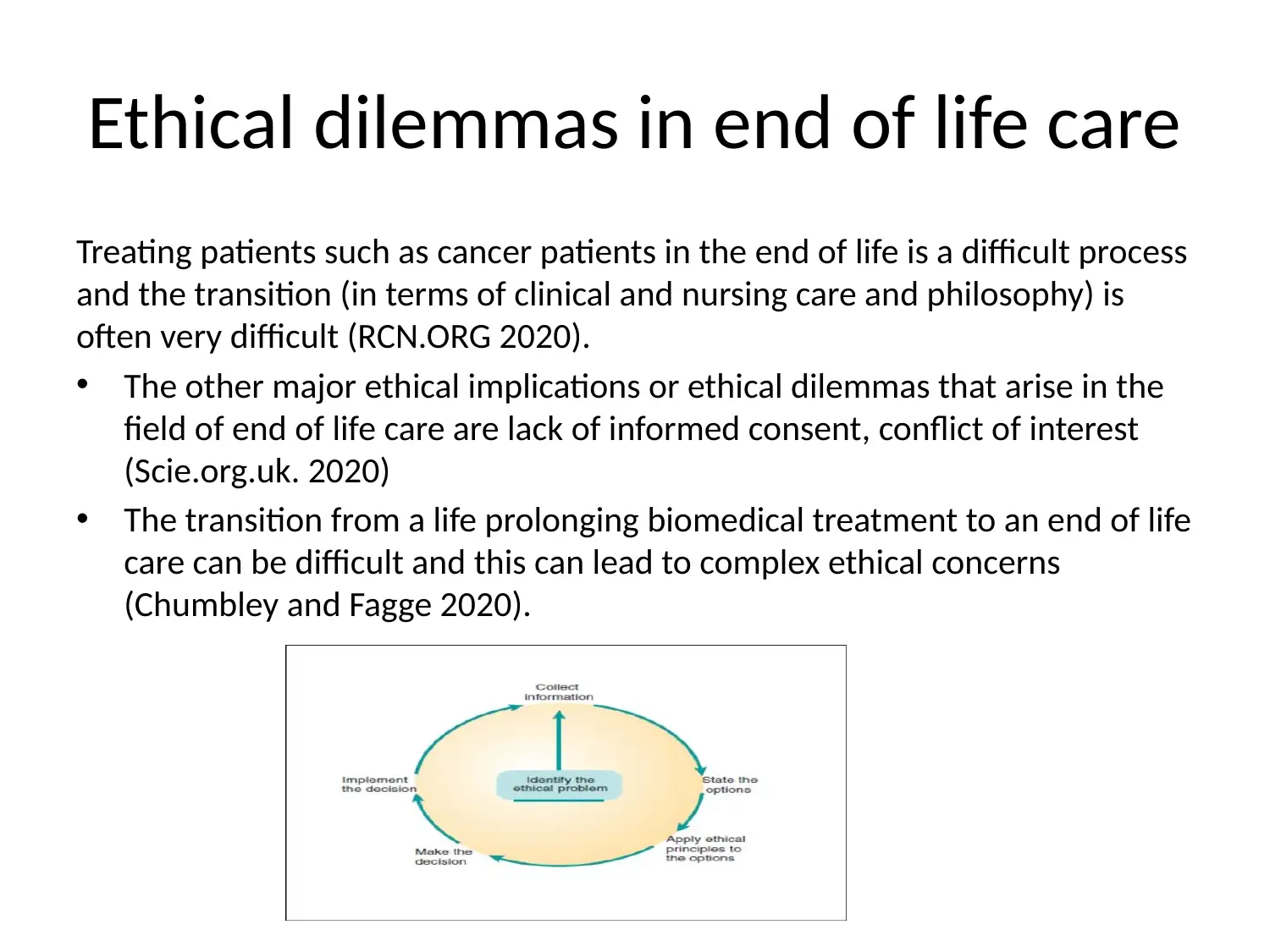
Ethical dilemmas in end of life care
Treating patients such as cancer patients in the end of life is a difficult process
and the transition (in terms of clinical and nursing care and philosophy) is
often very difficult (RCN.ORG 2020).
• The other major ethical implications or ethical dilemmas that arise in the
field of end of life care are lack of informed consent, conflict of interest
(Scie.org.uk. 2020)
• The transition from a life prolonging biomedical treatment to an end of life
care can be difficult and this can lead to complex ethical concerns
(Chumbley and Fagge 2020).
Treating patients such as cancer patients in the end of life is a difficult process
and the transition (in terms of clinical and nursing care and philosophy) is
often very difficult (RCN.ORG 2020).
• The other major ethical implications or ethical dilemmas that arise in the
field of end of life care are lack of informed consent, conflict of interest
(Scie.org.uk. 2020)
• The transition from a life prolonging biomedical treatment to an end of life
care can be difficult and this can lead to complex ethical concerns
(Chumbley and Fagge 2020).
⊘ This is a preview!⊘
Do you want full access?
Subscribe today to unlock all pages.

Trusted by 1+ million students worldwide
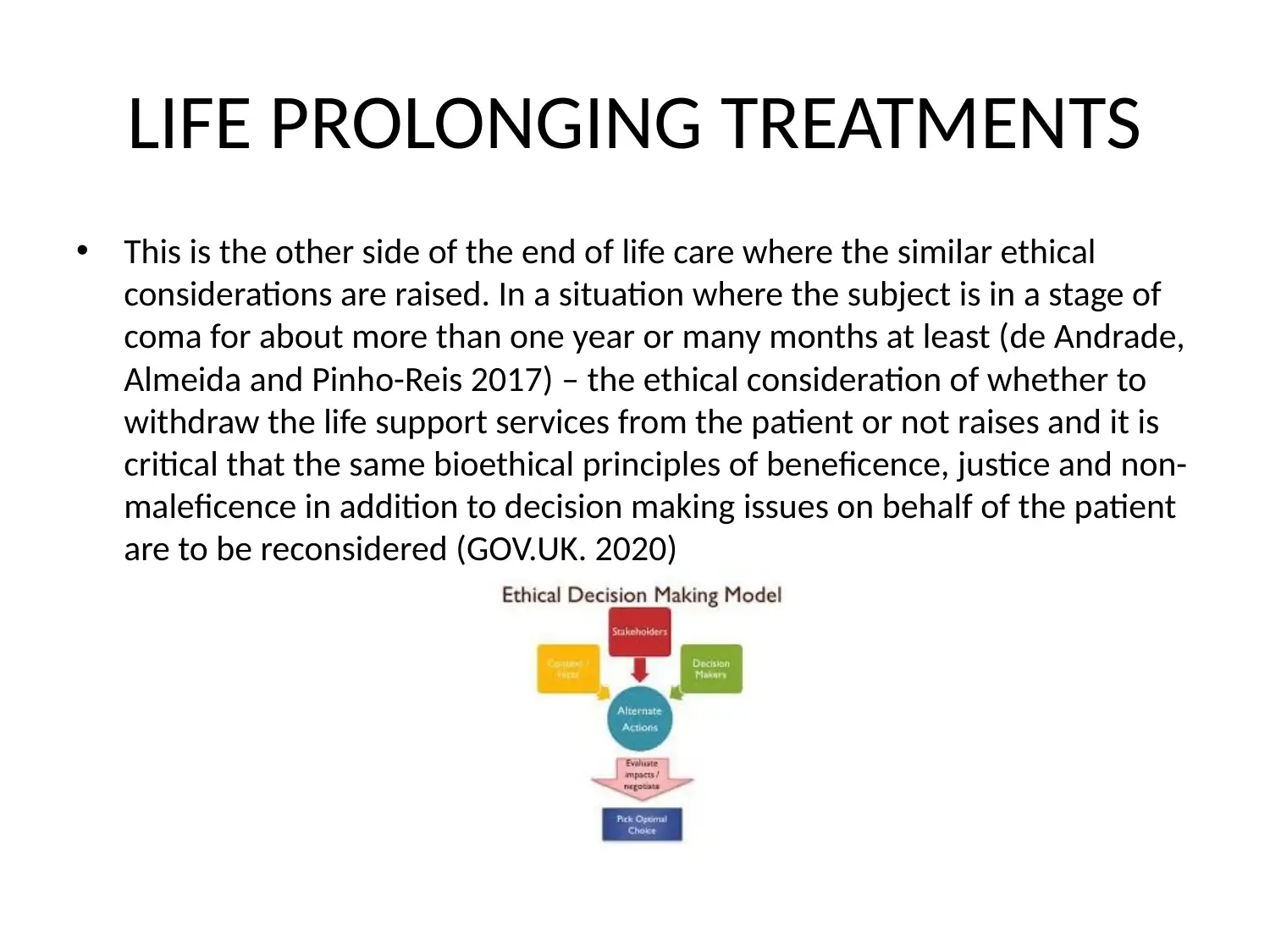
LIFE PROLONGING TREATMENTS
• This is the other side of the end of life care where the similar ethical
considerations are raised. In a situation where the subject is in a stage of
coma for about more than one year or many months at least (de Andrade,
Almeida and Pinho-Reis 2017) – the ethical consideration of whether to
withdraw the life support services from the patient or not raises and it is
critical that the same bioethical principles of beneficence, justice and non-
maleficence in addition to decision making issues on behalf of the patient
are to be reconsidered (GOV.UK. 2020)
• This is the other side of the end of life care where the similar ethical
considerations are raised. In a situation where the subject is in a stage of
coma for about more than one year or many months at least (de Andrade,
Almeida and Pinho-Reis 2017) – the ethical consideration of whether to
withdraw the life support services from the patient or not raises and it is
critical that the same bioethical principles of beneficence, justice and non-
maleficence in addition to decision making issues on behalf of the patient
are to be reconsidered (GOV.UK. 2020)
Paraphrase This Document
Need a fresh take? Get an instant paraphrase of this document with our AI Paraphraser
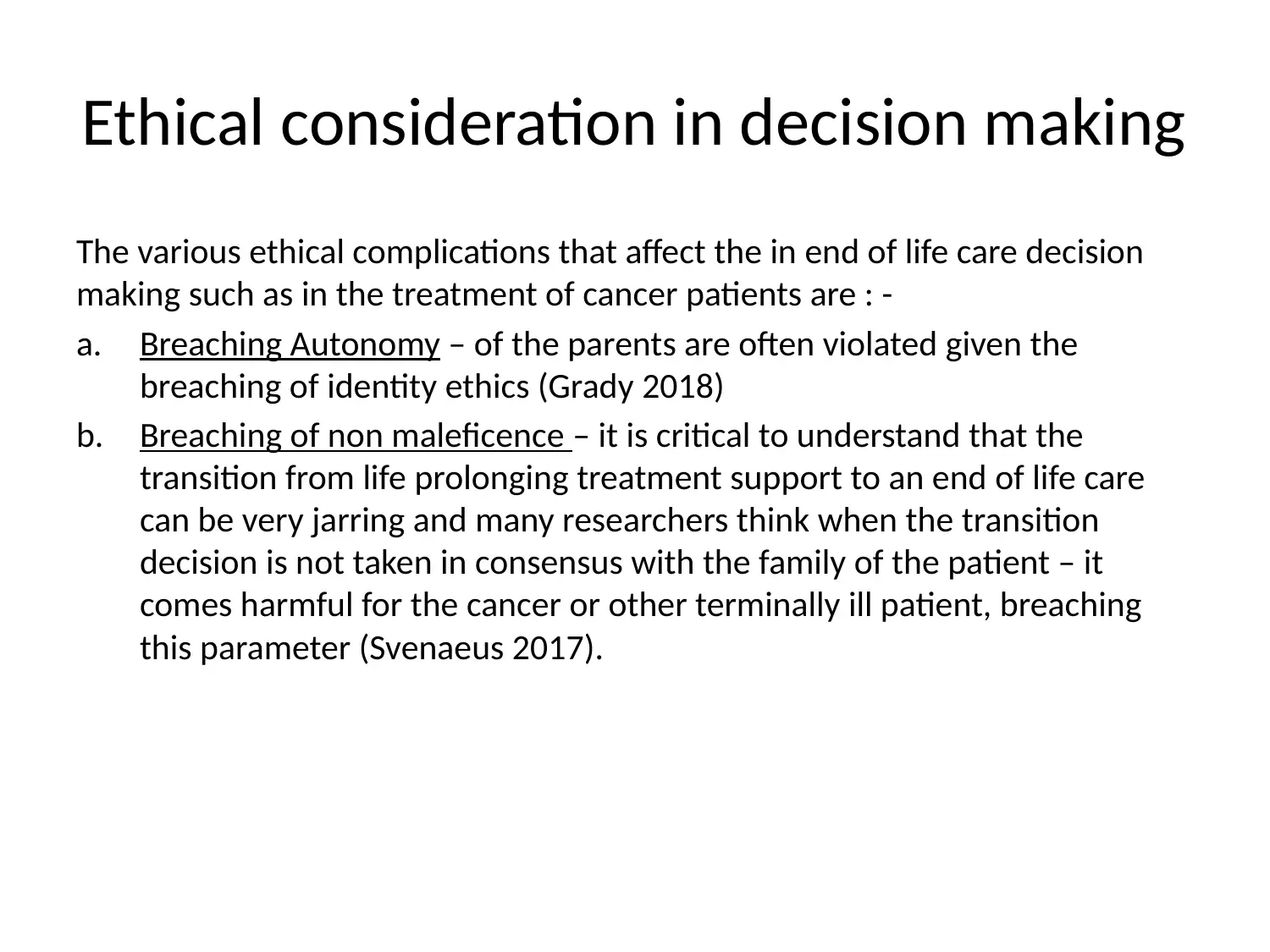
Ethical consideration in decision making
The various ethical complications that affect the in end of life care decision
making such as in the treatment of cancer patients are : -
a. Breaching Autonomy – of the parents are often violated given the
breaching of identity ethics (Grady 2018)
b. Breaching of non maleficence – it is critical to understand that the
transition from life prolonging treatment support to an end of life care
can be very jarring and many researchers think when the transition
decision is not taken in consensus with the family of the patient – it
comes harmful for the cancer or other terminally ill patient, breaching
this parameter (Svenaeus 2017).
The various ethical complications that affect the in end of life care decision
making such as in the treatment of cancer patients are : -
a. Breaching Autonomy – of the parents are often violated given the
breaching of identity ethics (Grady 2018)
b. Breaching of non maleficence – it is critical to understand that the
transition from life prolonging treatment support to an end of life care
can be very jarring and many researchers think when the transition
decision is not taken in consensus with the family of the patient – it
comes harmful for the cancer or other terminally ill patient, breaching
this parameter (Svenaeus 2017).
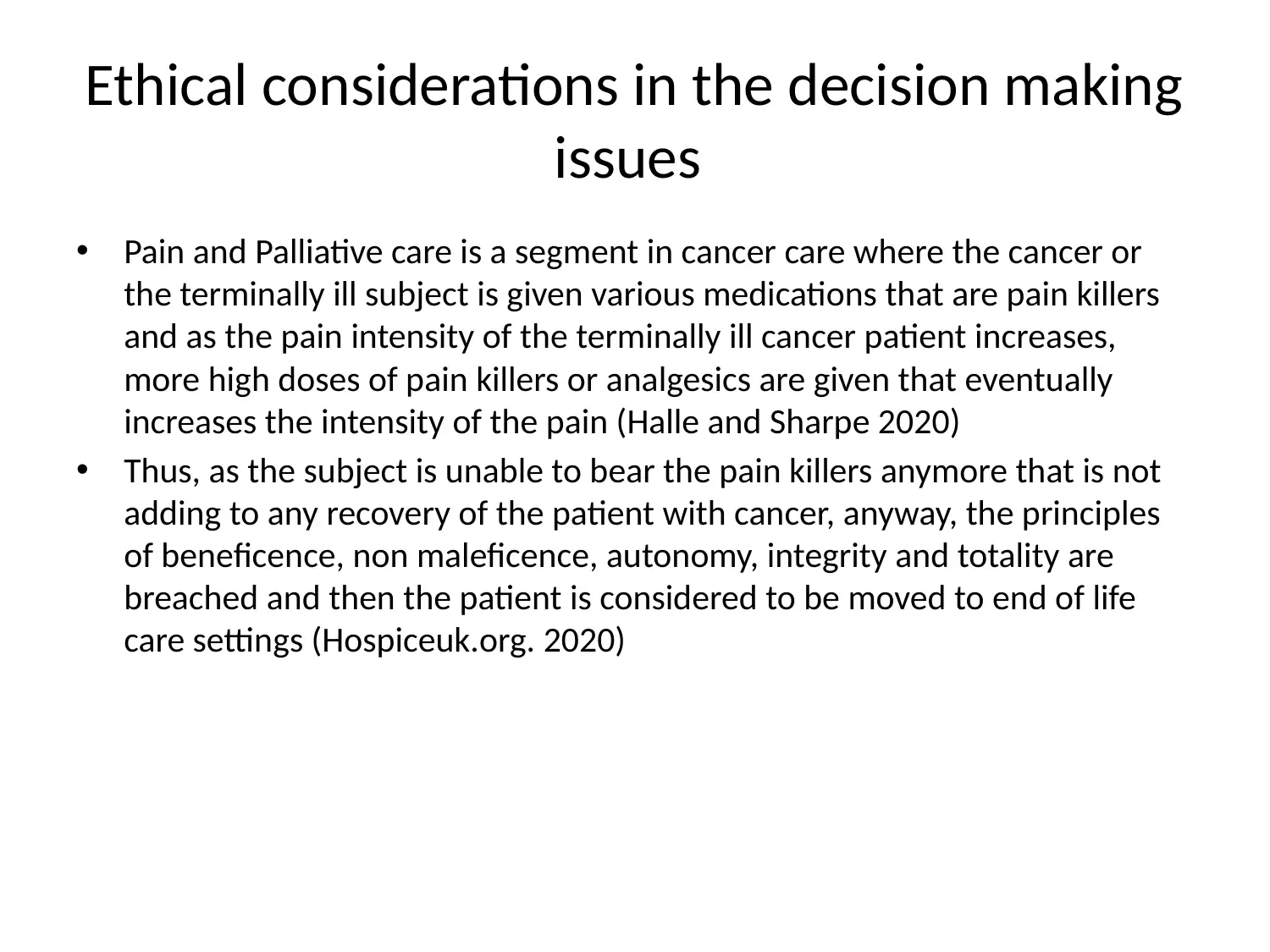
Ethical considerations in the decision making
issues
• Pain and Palliative care is a segment in cancer care where the cancer or
the terminally ill subject is given various medications that are pain killers
and as the pain intensity of the terminally ill cancer patient increases,
more high doses of pain killers or analgesics are given that eventually
increases the intensity of the pain (Halle and Sharpe 2020)
• Thus, as the subject is unable to bear the pain killers anymore that is not
adding to any recovery of the patient with cancer, anyway, the principles
of beneficence, non maleficence, autonomy, integrity and totality are
breached and then the patient is considered to be moved to end of life
care settings (Hospiceuk.org. 2020)
issues
• Pain and Palliative care is a segment in cancer care where the cancer or
the terminally ill subject is given various medications that are pain killers
and as the pain intensity of the terminally ill cancer patient increases,
more high doses of pain killers or analgesics are given that eventually
increases the intensity of the pain (Halle and Sharpe 2020)
• Thus, as the subject is unable to bear the pain killers anymore that is not
adding to any recovery of the patient with cancer, anyway, the principles
of beneficence, non maleficence, autonomy, integrity and totality are
breached and then the patient is considered to be moved to end of life
care settings (Hospiceuk.org. 2020)
⊘ This is a preview!⊘
Do you want full access?
Subscribe today to unlock all pages.

Trusted by 1+ million students worldwide
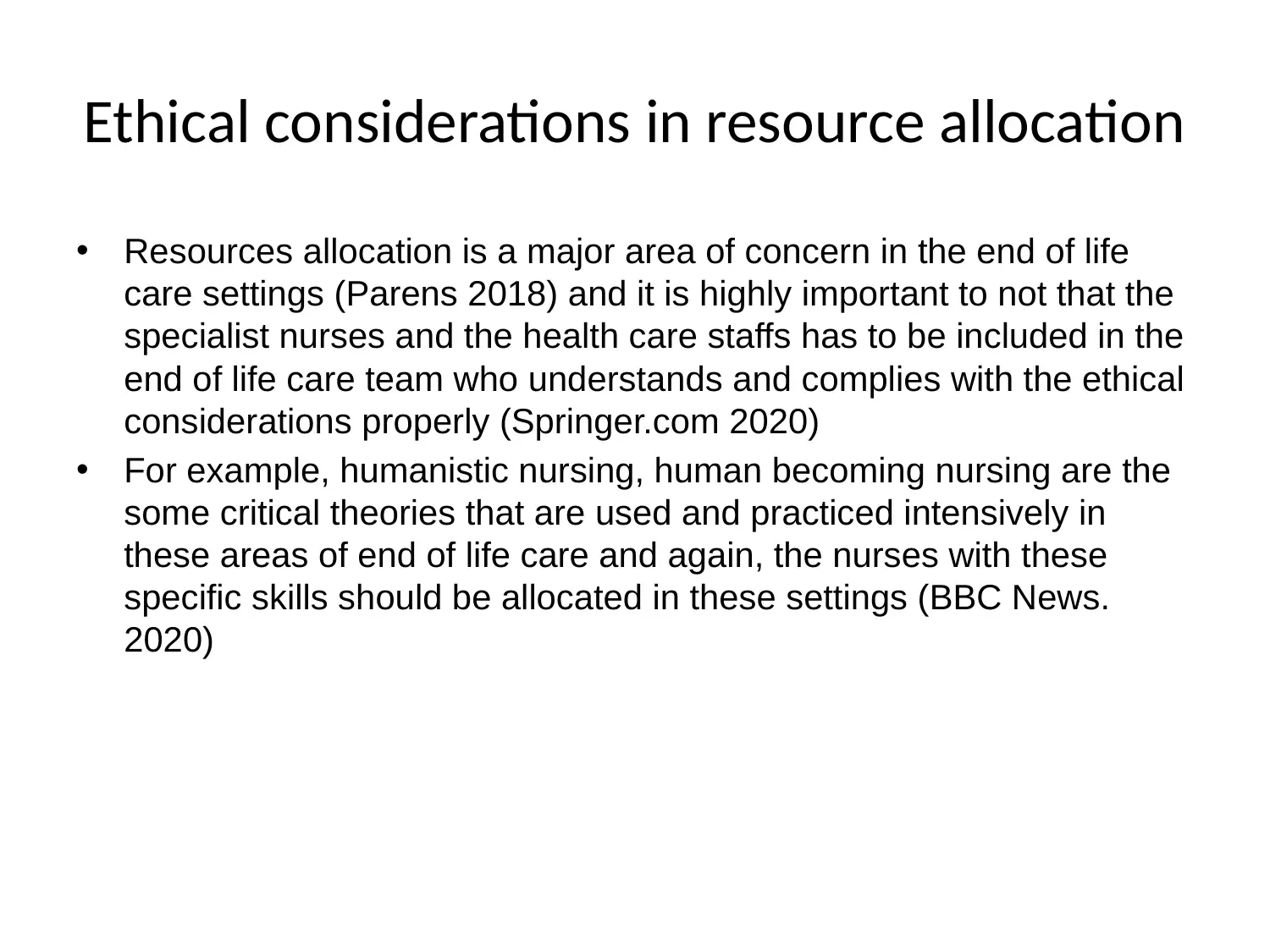
Ethical considerations in resource allocation
• Resources allocation is a major area of concern in the end of life
care settings (Parens 2018) and it is highly important to not that the
specialist nurses and the health care staffs has to be included in the
end of life care team who understands and complies with the ethical
considerations properly (Springer.com 2020)
• For example, humanistic nursing, human becoming nursing are the
some critical theories that are used and practiced intensively in
these areas of end of life care and again, the nurses with these
specific skills should be allocated in these settings (BBC News.
2020)
• Resources allocation is a major area of concern in the end of life
care settings (Parens 2018) and it is highly important to not that the
specialist nurses and the health care staffs has to be included in the
end of life care team who understands and complies with the ethical
considerations properly (Springer.com 2020)
• For example, humanistic nursing, human becoming nursing are the
some critical theories that are used and practiced intensively in
these areas of end of life care and again, the nurses with these
specific skills should be allocated in these settings (BBC News.
2020)
Paraphrase This Document
Need a fresh take? Get an instant paraphrase of this document with our AI Paraphraser
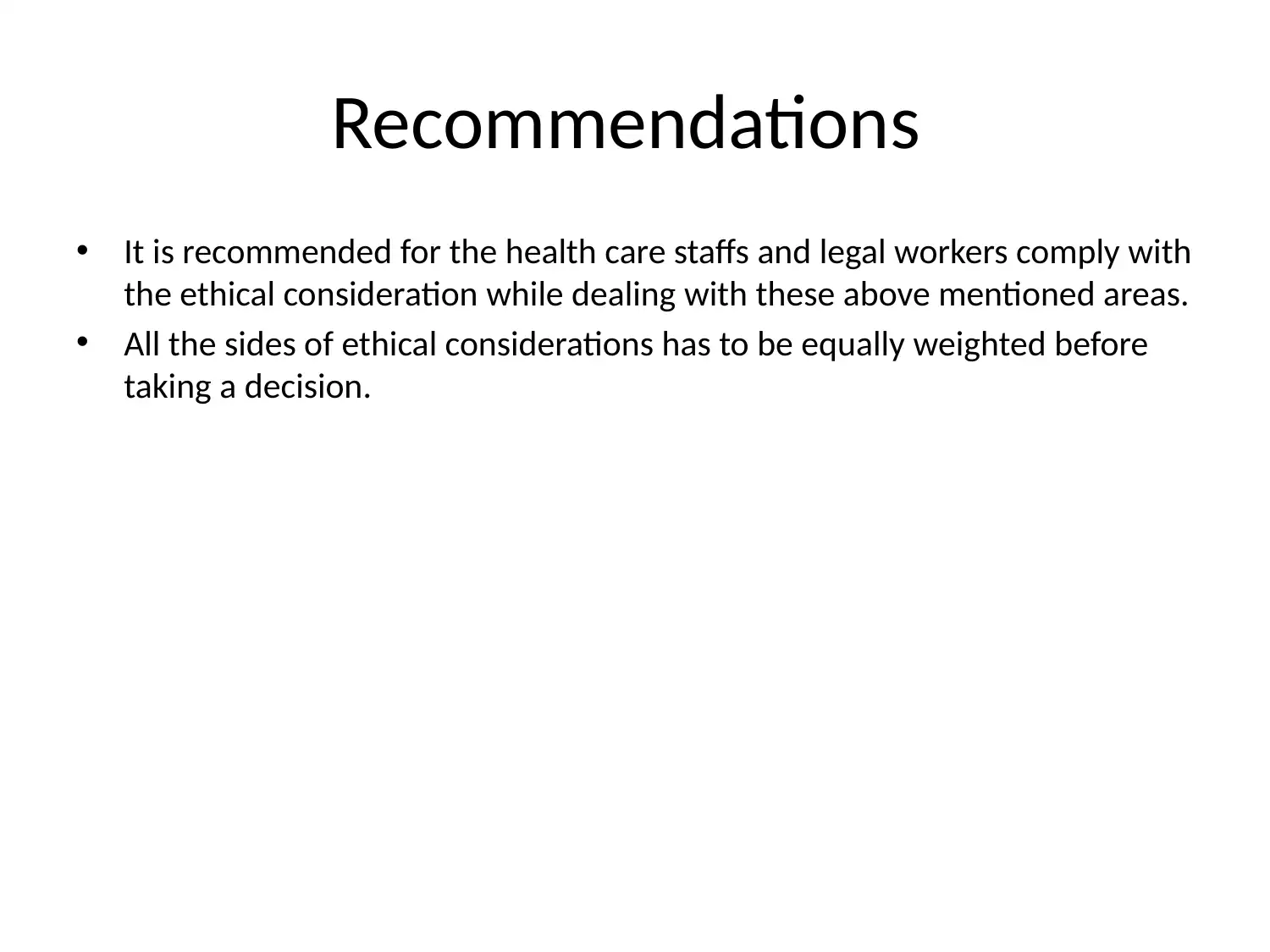
Recommendations
• It is recommended for the health care staffs and legal workers comply with
the ethical consideration while dealing with these above mentioned areas.
• All the sides of ethical considerations has to be equally weighted before
taking a decision.
• It is recommended for the health care staffs and legal workers comply with
the ethical consideration while dealing with these above mentioned areas.
• All the sides of ethical considerations has to be equally weighted before
taking a decision.
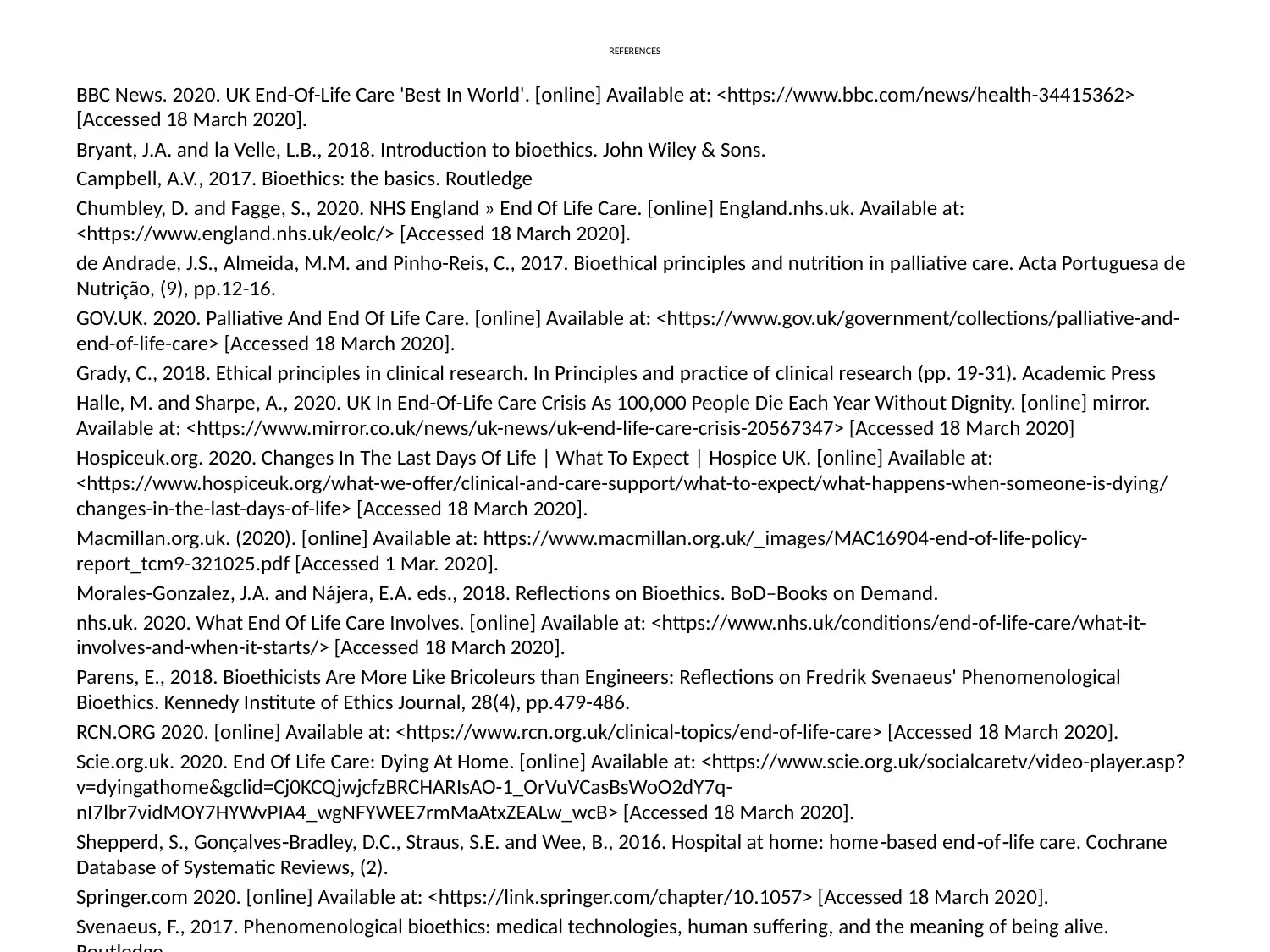
REFERENCES
BBC News. 2020. UK End-Of-Life Care 'Best In World'. [online] Available at: <https://www.bbc.com/news/health-34415362>
[Accessed 18 March 2020].
Bryant, J.A. and la Velle, L.B., 2018. Introduction to bioethics. John Wiley & Sons.
Campbell, A.V., 2017. Bioethics: the basics. Routledge
Chumbley, D. and Fagge, S., 2020. NHS England » End Of Life Care. [online] England.nhs.uk. Available at:
<https://www.england.nhs.uk/eolc/> [Accessed 18 March 2020].
de Andrade, J.S., Almeida, M.M. and Pinho-Reis, C., 2017. Bioethical principles and nutrition in palliative care. Acta Portuguesa de
Nutrição, (9), pp.12-16.
GOV.UK. 2020. Palliative And End Of Life Care. [online] Available at: <https://www.gov.uk/government/collections/palliative-and-
end-of-life-care> [Accessed 18 March 2020].
Grady, C., 2018. Ethical principles in clinical research. In Principles and practice of clinical research (pp. 19-31). Academic Press
Halle, M. and Sharpe, A., 2020. UK In End-Of-Life Care Crisis As 100,000 People Die Each Year Without Dignity. [online] mirror.
Available at: <https://www.mirror.co.uk/news/uk-news/uk-end-life-care-crisis-20567347> [Accessed 18 March 2020]
Hospiceuk.org. 2020. Changes In The Last Days Of Life | What To Expect | Hospice UK. [online] Available at:
<https://www.hospiceuk.org/what-we-offer/clinical-and-care-support/what-to-expect/what-happens-when-someone-is-dying/
changes-in-the-last-days-of-life> [Accessed 18 March 2020].
Macmillan.org.uk. (2020). [online] Available at: https://www.macmillan.org.uk/_images/MAC16904-end-of-life-policy-
report_tcm9-321025.pdf [Accessed 1 Mar. 2020].
Morales-Gonzalez, J.A. and Nájera, E.A. eds., 2018. Reflections on Bioethics. BoD–Books on Demand.
nhs.uk. 2020. What End Of Life Care Involves. [online] Available at: <https://www.nhs.uk/conditions/end-of-life-care/what-it-
involves-and-when-it-starts/> [Accessed 18 March 2020].
Parens, E., 2018. Bioethicists Are More Like Bricoleurs than Engineers: Reflections on Fredrik Svenaeus' Phenomenological
Bioethics. Kennedy Institute of Ethics Journal, 28(4), pp.479-486.
RCN.ORG 2020. [online] Available at: <https://www.rcn.org.uk/clinical-topics/end-of-life-care> [Accessed 18 March 2020].
Scie.org.uk. 2020. End Of Life Care: Dying At Home. [online] Available at: <https://www.scie.org.uk/socialcaretv/video-player.asp?
v=dyingathome&gclid=Cj0KCQjwjcfzBRCHARIsAO-1_OrVuVCasBsWoO2dY7q-
nI7lbr7vidMOY7HYWvPIA4_wgNFYWEE7rmMaAtxZEALw_wcB> [Accessed 18 March 2020].
Shepperd, S., Gonçalves Bradley, D.C., Straus, S.E. and Wee, B., 2016. Hospital at home: home based end of life care. Cochrane‐ ‐ ‐ ‐
Database of Systematic Reviews, (2).
Springer.com 2020. [online] Available at: <https://link.springer.com/chapter/10.1057> [Accessed 18 March 2020].
Svenaeus, F., 2017. Phenomenological bioethics: medical technologies, human suffering, and the meaning of being alive.
BBC News. 2020. UK End-Of-Life Care 'Best In World'. [online] Available at: <https://www.bbc.com/news/health-34415362>
[Accessed 18 March 2020].
Bryant, J.A. and la Velle, L.B., 2018. Introduction to bioethics. John Wiley & Sons.
Campbell, A.V., 2017. Bioethics: the basics. Routledge
Chumbley, D. and Fagge, S., 2020. NHS England » End Of Life Care. [online] England.nhs.uk. Available at:
<https://www.england.nhs.uk/eolc/> [Accessed 18 March 2020].
de Andrade, J.S., Almeida, M.M. and Pinho-Reis, C., 2017. Bioethical principles and nutrition in palliative care. Acta Portuguesa de
Nutrição, (9), pp.12-16.
GOV.UK. 2020. Palliative And End Of Life Care. [online] Available at: <https://www.gov.uk/government/collections/palliative-and-
end-of-life-care> [Accessed 18 March 2020].
Grady, C., 2018. Ethical principles in clinical research. In Principles and practice of clinical research (pp. 19-31). Academic Press
Halle, M. and Sharpe, A., 2020. UK In End-Of-Life Care Crisis As 100,000 People Die Each Year Without Dignity. [online] mirror.
Available at: <https://www.mirror.co.uk/news/uk-news/uk-end-life-care-crisis-20567347> [Accessed 18 March 2020]
Hospiceuk.org. 2020. Changes In The Last Days Of Life | What To Expect | Hospice UK. [online] Available at:
<https://www.hospiceuk.org/what-we-offer/clinical-and-care-support/what-to-expect/what-happens-when-someone-is-dying/
changes-in-the-last-days-of-life> [Accessed 18 March 2020].
Macmillan.org.uk. (2020). [online] Available at: https://www.macmillan.org.uk/_images/MAC16904-end-of-life-policy-
report_tcm9-321025.pdf [Accessed 1 Mar. 2020].
Morales-Gonzalez, J.A. and Nájera, E.A. eds., 2018. Reflections on Bioethics. BoD–Books on Demand.
nhs.uk. 2020. What End Of Life Care Involves. [online] Available at: <https://www.nhs.uk/conditions/end-of-life-care/what-it-
involves-and-when-it-starts/> [Accessed 18 March 2020].
Parens, E., 2018. Bioethicists Are More Like Bricoleurs than Engineers: Reflections on Fredrik Svenaeus' Phenomenological
Bioethics. Kennedy Institute of Ethics Journal, 28(4), pp.479-486.
RCN.ORG 2020. [online] Available at: <https://www.rcn.org.uk/clinical-topics/end-of-life-care> [Accessed 18 March 2020].
Scie.org.uk. 2020. End Of Life Care: Dying At Home. [online] Available at: <https://www.scie.org.uk/socialcaretv/video-player.asp?
v=dyingathome&gclid=Cj0KCQjwjcfzBRCHARIsAO-1_OrVuVCasBsWoO2dY7q-
nI7lbr7vidMOY7HYWvPIA4_wgNFYWEE7rmMaAtxZEALw_wcB> [Accessed 18 March 2020].
Shepperd, S., Gonçalves Bradley, D.C., Straus, S.E. and Wee, B., 2016. Hospital at home: home based end of life care. Cochrane‐ ‐ ‐ ‐
Database of Systematic Reviews, (2).
Springer.com 2020. [online] Available at: <https://link.springer.com/chapter/10.1057> [Accessed 18 March 2020].
Svenaeus, F., 2017. Phenomenological bioethics: medical technologies, human suffering, and the meaning of being alive.
⊘ This is a preview!⊘
Do you want full access?
Subscribe today to unlock all pages.

Trusted by 1+ million students worldwide
1 out of 9
Related Documents
Your All-in-One AI-Powered Toolkit for Academic Success.
+13062052269
info@desklib.com
Available 24*7 on WhatsApp / Email
![[object Object]](/_next/static/media/star-bottom.7253800d.svg)
Unlock your academic potential
Copyright © 2020–2026 A2Z Services. All Rights Reserved. Developed and managed by ZUCOL.





